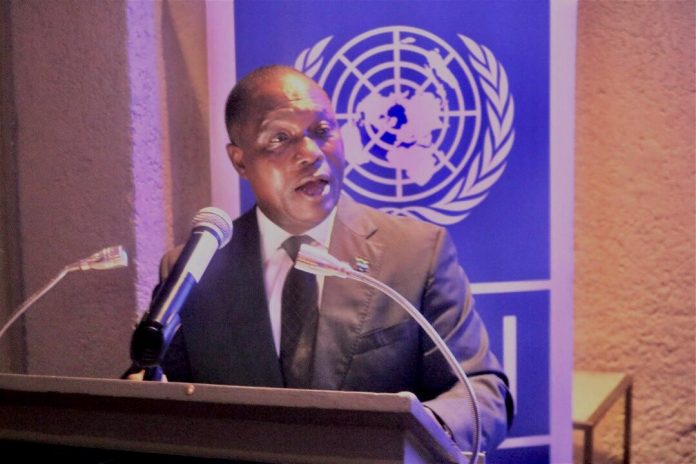By Theresa Kef Sesay
The Sierra Leonean Minister of Planning and Economic Development, Dr. Francis Kai-Kai and the Canadian Minister of International Development, the Hon. Karina Gould have offered a strong statement of solidarity in the fight against the Coronavirus pandemic.
In their joint statement, as co-chairs of the International Dialogue on Peacebuilding and Statebuilding (IDPS), the Ministers said that the IDPS and its members were standing in solidarity with all those affected by the COVID-19 pandemic; noting that the pandemic was a human tragedy and a global crisis that posed grave risks for fragile and conflict-affected states (FCAS) that extended beyond direct health impacts alone.
The Ministers said, “Together, we are particularly concerned about the pandemic’s potentially destabilizing socio-economic impacts in FCAS. In this regard, we support the United Nations Secretary-General’s call for a global ceasefire to allow countries to unite in responding to the pandemic. In the spirit of cooperation and mutual support, we also welcome the statements on responding to the pandemic made by the g7+ group of FCAS and the Civil Society Platform for Peacebuilding and State building [CSPPS].
They noted that at this difficult time, they were drawing the international community’s attention to the need for a holistic COVID-19 response to ensuring that hard-won peacebuilding, statebuilding and conflict-prevention gains in FCAS were sustained; they said It would require responses that draw on integrated support from partners across the humanitarian-development-peace nexus and that were also inclusive, nationally led, conflict-sensitive, attuned to conflict drivers and focused on prevention and resilience. The Ministers stated that without that cooperation, the goals of the 2030 Agenda for Sustainable Development risk slipping further out of reach.
“In this context, we reaffirm our commitment to advocating for COVID-19 response efforts that advance priorities established by IDPS members in the IDPS 2019 to 2021 Peace Vision, the 2030 Agenda (notably Sustainable Development Goal 16+), the New Deal for Engagement in Fragile States and the Stockholm Declaration. We reaffirm the relevance of our Peace Vision priority themes in our COVID-19 response efforts to enhance national cohesion; advance gender equality and the Women, Peace and Security Agenda; and support a peace-promoting private sector”, they ended.
The statement continued by encouraging national governments to ensure that measures used to respond to COVID-19 contribute to just and inclusive societies and do not hamper contributions from various actors, including youths, women peacebuilders and human rights defenders. It also reiterated the need to continue supporting the protection and expansion of civil society’s operating space in implementing measures to address the pandemic, including during lockdowns.
They said, “Recognizing that women, girls and other vulnerable groups, such as migrants, refugees and those living in poverty, will be disproportionally affected by the crisis, the global response must be gender responsive and include interventions that protect all vulnerable groups from potential violence and other effects of COVID-19 responses. In this context, we also acknowledge the need to galvanize support from the private sector to support pro-peace activities, as well as safeguard livelihoods and the immediate and longer-term economic effects for people affected by the crisis. Together, we would strive to protect official development assistance budgets, encourage other financial flows to support governments and communities in FCAS and invite all of our peacebuilding partners to do the same”.
The Ministers noted that the COVID-19 pandemic had created a global crisis, stressing that national responses alone would be insufficient to cope with the various dimensions of its impact (political, economic, social and human capital). They said the IDPS, as a unique tripartite platform, had an important role to play in bringing together development partners, the g7+ Group and civil society to preserve peace. In addressing this highly complex crisis, the IDPS partnership would endeavour to mobilize diverse actors to ensure inclusive dialogue and collective engagement, and to foster South-South, triangular and fragile-fragile cooperation.
They said they would work together to ensure that their peacebuilding, statebuilding and conflict-prevention objectives remained at the forefront of responses to the pandemic, and together, “we would continue to advance our common objective of driving positive change for those in fragile and conflict-affected situations.”




